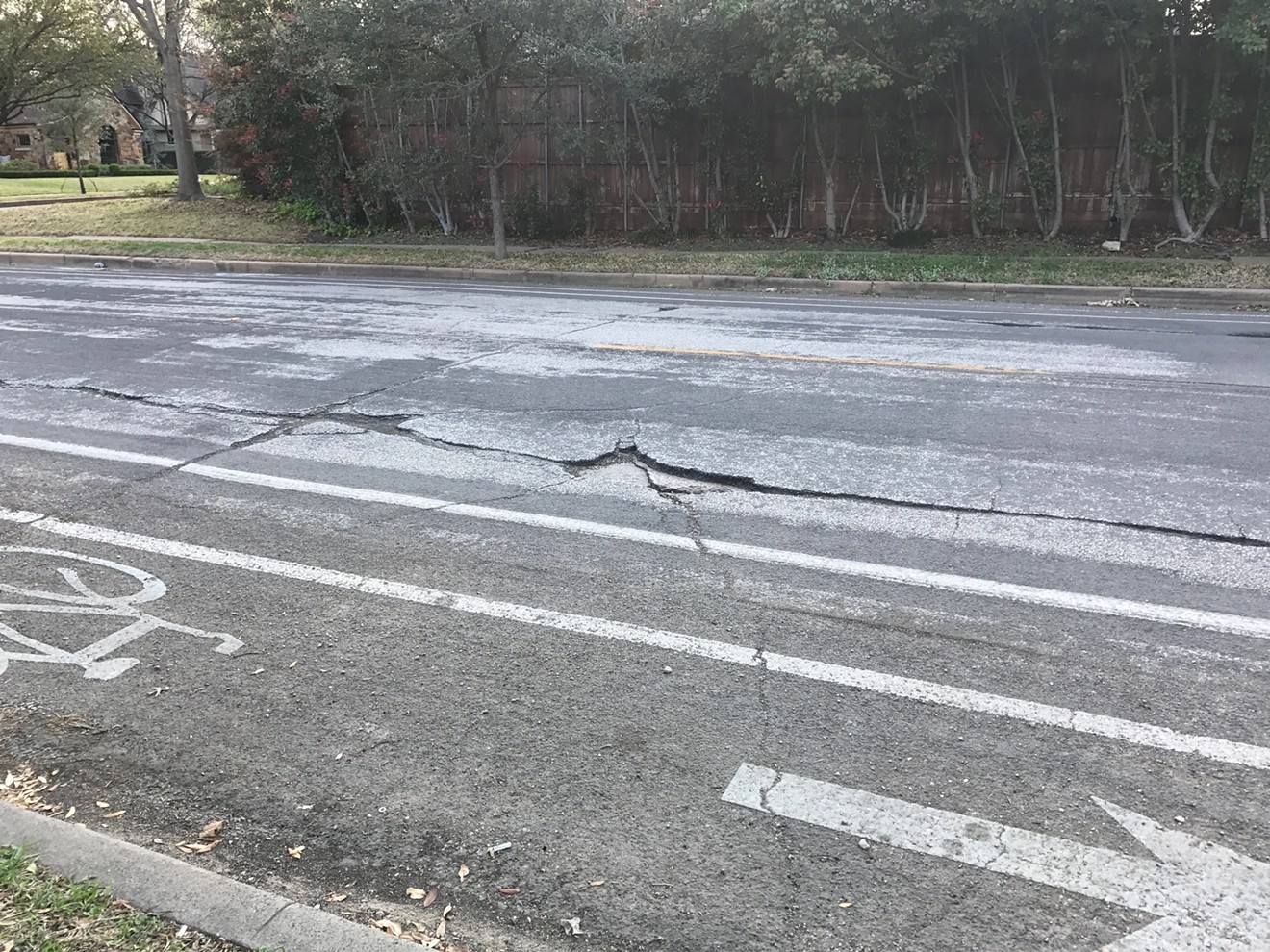Reports have estimated that Dallas needs to spend hundreds of millions of dollars on its mangled streets over the next decade if it expects them to get better. In 2019, City Council was told that Dallas' 11,775 miles of streets, some of which are littered with cracks and potholes, were given a pavement condition index rating of 65.4%.
But according to a recent audit, the city doesn't adequately keep track of projects meant to improve these conditions. Between 2019 and 2021, the Department of Public Works spent nearly $289 million on two contractors for various road pavement and improvement projects. Now, the city isn't sure if it needed to spend all that money or whether the work was done up to snuff and in a timely manner, Dallas City Auditor Mark Swann found when reviewing the contractors and their work.
According to the auditor, the projects those contractors worked on weren’t consistently monitored or inspected for quality and timely performance. The project information isn’t centralized or reliable either. Additionally, expenditures are not consistently verified, and there’s often no documented explanation for why projects go over budget.
The department also didn’t follow all bid protocol procedures for contractors it hired, like evaluating the contractors' experience and financial capability.
“The Department of Public Works generally adhered to bid protocols as specified in the Request for Proposals to bid road pavement activities,” the audit said. “However, there is no evidence that contractor experience, financial capability, and safety and environmental records were verified.”
The Department of Public Works should be performing various quality tests and using progress reports and construction schedules to make sure work is done correctly. “However, the documentation of required monitoring activities is either missing or incomplete,” the audit said.
Of 16 randomly selected project files, only one included evidence of required compression strength testing. Worse still, none of those 16 included evidence that they had received a final inspection.
The department told the auditor that inspection activities are prioritized based on street classification because of limited resources. The department said all projects are inspected to ensure the quality of work. But evidence of final inspection activities weren’t provided in the project files, according to the auditor.
The auditor worries this puts the city at high risk, explaining that the department should revise and implement ways to track quality control tests of all pavement maintenance and road resurfacing projects. They should also find a way to track how long these projects take.
The Department of Public Works doesn’t consistently document and review quantities of materials invoiced for these projects. Because of this, “there is an increased risk of fraudulent activities or improper payment to contractors,” according to the auditor.
Out of 16 randomly selected projects, only two included documentation that could validate what was invoiced for. But even in those two projects, the documentation wasn’t complete, so it’s unclear what exactly the city is paying for and why.
For example, one of those projects called for about 2,000 square yards of 10-inch thick reinforced concrete pavement. But more than double that was invoiced for, amounting to more than $200,000 in “potential overbilling to the city,” according to the audit.
When it came to overspending, six of the 16 randomly selected projects were completed “with significant cost overages,” but no documentation regarding why the projects went over budget.
Over the period of time the auditor looked at, the two contractors’ projects were $15,554,244 over budget – some 12% above estimated costs. “Public Works does not document the reasons for project cost overages and does not monitor and evaluate root causes for cost overages to enhance accuracy and reasonableness of cost estimates for road pavement projects,” the audit said.
The department needs to start documenting reasons for these overages and try to figure out the root cause of them, the auditor said."There is an increased risk of fraudulent activities or improper payment to contractors." – Dallas City Auditor Mark Swann
tweet this
The information for all these projects also isn’t centralized, reliable or stored in such a way that it is readily available. The city can’t ensure accurate reporting of project statuses because of this, which has led to construction permits expiring before projects are completed. Sometimes, they would expire before work ever began. For one project, construction began before required permits were obtained. In two other projects, permits weren’t obtained at all.
The auditor recommended the department find a way to track construction permit status and expiration to make sure it’s in compliance with city code. The department also needs to develop new or upgraded systems to track the status and history of these projects.
Earlier this month, City Manager T.C. Broadnax responded to the auditor and their recommendations saying he agreed with most of them. Some, however, could be too costly to fulfill.
“In summary, management agrees to implement most of the auditors’ high-risk recommendations,” Broadnax said in a Feb. 8 memo. “However, management will accept the risk for many of the moderate-risk recommendations as most would require additional staff or significant investments in systems that are not currently budgeted.”
The city manager agrees they should have better systems in place to track quality control testing, timeliness and the materials used for these projects. He said the department of public works is already working on some of these recommendations. However, he said monitoring the over spending on the projects would require too many additional staff members and cost too much money.
Audits of the city’s paving and maintenance program/capital program streets and thoroughfares were also conducted in 2015 and 2017. They found, more or less, the same problems: unmet inspection requirements, lack of documentation, and inconsistent or unreliable use of project management systems.












